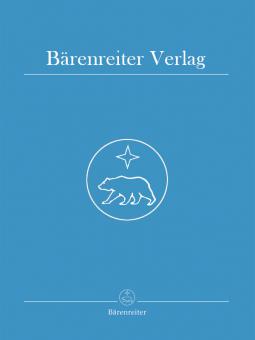Christoph Willibald Gluck
Musik zu 'Soliman second, ou Les Trois Sultanes'
Music to 'Soliman second, ou Les Trois Sultanes' - Complete Works IV/4
Christoph Willibald Gluck
Musik zu 'Soliman second, ou Les Trois Sultanes'
Music to 'Soliman second, ou Les Trois Sultanes' - Complete Works IV/4
- Compositor Christoph Willibald Gluck
- Editor Yuliya Shein
- Editorial Bärenreiter Verlag
- Nº de pedido BA5823-01
IVA incluido.,
Más gastos de envío
No disponible en todos los países. Leer más
Descripción de la:
The critical edition presents the music to the verse comedy 'Soliman second, ou Les Trois Sultanes' by Charles-Simon Favart (1710-1792), which was performed before the Viennese courtly audience in the Schlosstheater Laxenburg by the French troupe of the Burgtheater on 18 May 1765. This is the first time that Gluck's music to the Favartian comedy has appeared in print.
A popular comedy which in particular was known for its exotic colour, 'Soliman second' quickly made its mark on many European stages. Through the good offices of the court theatre director Count Durazzo, the libretto made its way to Vienna too. As 'Direttore della Musica' at Vienna's Burgtheater and an accomplished writer of French opéras-comiques, Gluck may have been commissioned to compose the vocal numbers - four solo airs and a duet - which were meant to be performed in the comedy. As far as can be established, Gluck's involvement in incidental music is an exception in his artistic output.
In addition to the detailed introduction to the history of the work, the volume contains the Critical Report providing exhaustive information on the source material, editorial technique and performance practice. The libretto for the premiere performance and illustrative extracts from the sources are reproduced in facsimile.
A popular comedy which in particular was known for its exotic colour, 'Soliman second' quickly made its mark on many European stages. Through the good offices of the court theatre director Count Durazzo, the libretto made its way to Vienna too. As 'Direttore della Musica' at Vienna's Burgtheater and an accomplished writer of French opéras-comiques, Gluck may have been commissioned to compose the vocal numbers - four solo airs and a duet - which were meant to be performed in the comedy. As far as can be established, Gluck's involvement in incidental music is an exception in his artistic output.
In addition to the detailed introduction to the history of the work, the volume contains the Critical Report providing exhaustive information on the source material, editorial technique and performance practice. The libretto for the premiere performance and illustrative extracts from the sources are reproduced in facsimile.

